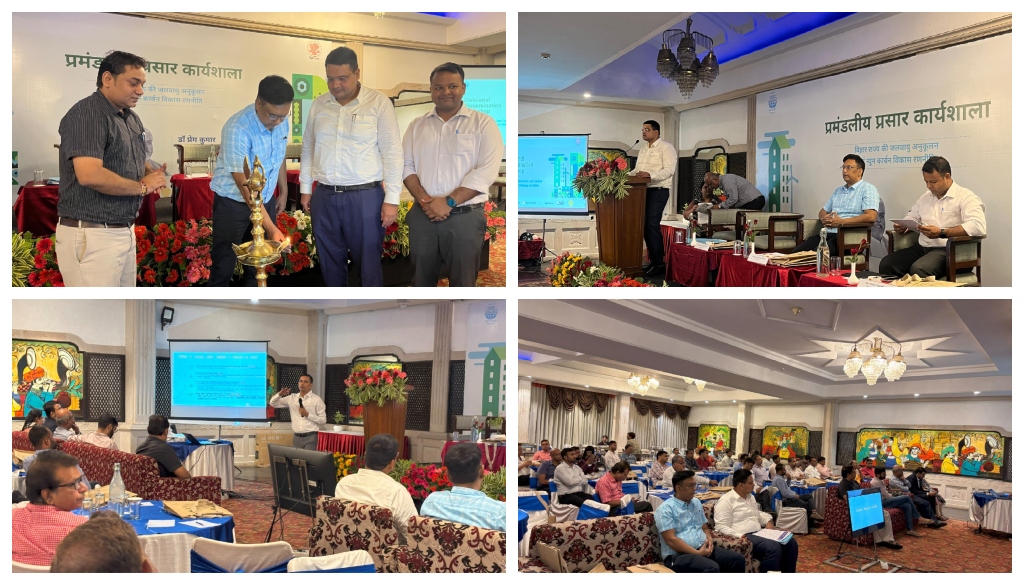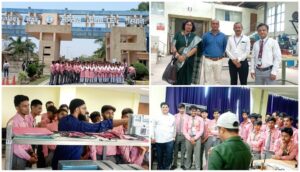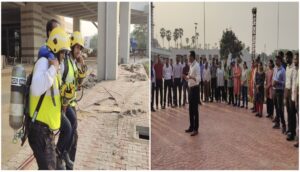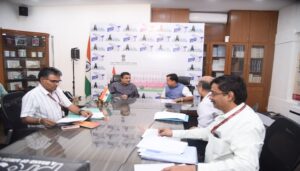Officials Gather in Patna to Drive Bihar’s Climate and Low Carbon Strategy

Patna: Bihar took a significant step forward in its journey towards carbon neutrality on Tuesday with a divisional-level workshop in Patna, focusing on the implementation of the Climate Resilient and Low Carbon Development Pathway for the state. The workshop, part of a broader capacity-building initiative, brought together key officials and stakeholders to discuss the urgent need for climate action and strategies to safeguard Bihar’s future in the face of escalating environmental challenges.
The workshop, chaired by Patna Divisional Commissioner Mayank Warwade, addressed the urgent need for climate action in Bihar. In his opening remarks, Warwade highlighted the state’s vulnerability to climate change, pointing to the annual floods in northern Bihar and droughts in the southern regions as clear examples of its impact. He praised the state’s climate strategy as a vital step towards safeguarding the environment for future generations.
Member Secretary of the Bihar State Pollution Control Board (BSPCB), Neeraj Narayan, echoed these sentiments, noting that Bihar’s goal of carbon neutrality by 2070 aligns with India’s national objectives. He emphasized that this ambition can only be realised through coordinated efforts across key departments such as Energy, Agriculture, Transport, and Water Resources, alongside the involvement of various stakeholders. Narayan further explained that the strategy has been shaped over the last two and a half years, following more than 250 stakeholder consultations.
Deputy Development Commissioner Sameer Saurabh, in his welcome address, spoke of the long-standing debate between economic growth and environmental conservation. He stressed that economic development and environmental protection do not have to be in conflict and can advance in parallel. Saurabh commended the proactive steps Bihar has taken with Climate Resilient and Low Carbon Development Pathway for the state, which outlines measures for climate resilience as well as adaptation.
Naveen Kumar, Senior Scientist at the BSPCB, reinforced the global nature of the climate crisis, referencing the 2021 Memorandum of Understanding (MoU) between the Government of Bihar and the United Nations Environment Programme (UNEP) for formulation of climate-resilient and low-carbon development pathway. He noted that the strategy was formally launched in March 2024, marking a significant milestone in the state’s climate efforts.
Senior program manager from WRI India, Dr. Shashidhar Kumar Jha and program manager Mani Bhushan Kumar Jha, provided a detailed overview of the climate resilient and low carbon development pathway. Mani Bhushan highlighted that the state currently emits approximately 9.7 crore tonnes of carbon dioxide, which accounts for 3% of India’s total emissions. He warned that emissions are likely to increase as development accelerates, but adopting a Net Zero strategy could help mitigate the impacts and reduce overall emissions.
Dr. Shashidhar added to these concerns, noting that Bihar’s temperature has risen by 0.8°C over the last 50 years and is projected to increase by up to 2.5°C by 2070. He outlined key climate adaptation measures, including crop diversification, integrated water management, forest conservation, and private sector engagement, as crucial steps towards reducing the state’s vulnerability to climate change.
The importance of local-level collaboration was further emphasised by Mohammad Shamshad Parvez, Team Coordinator at PRADAN. He called for greater community participation and convergence between government bodies, stressing that natural resource management at the panchayat level must be supported by resources, skills, and technology to address the challenges posed by climate change.
The workshop concluded with remarks from ADM, Patna, Ravindra Kumar Diwakar, who thanked all participants. The next divisional-level workshop is scheduled to take place in Gaya on Saturday, October 19.







